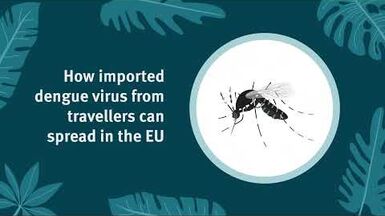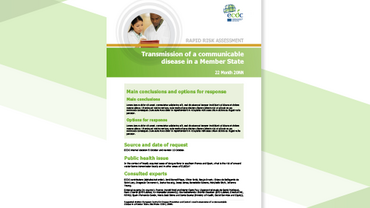Rapid risk assessment: Zika virus infection outbreak, French Polynesia
This document assesses the risk associated with the outbreak of Zika virus infections, considered as an emerging disease, to public health in the EU/EEA and the risk to EU/EEA citizens in order to anticipate future developments. The aim of this risk assessment is to summarise all available evidence on Zika virus epidemiology and disease presentation, and to assess the current outbreak of Zika in French Polynesia in view of this information, including the possible association with neurological and autoimmune complications.
Executive Summary
The Zika outbreak in French Polynesia could lead to travel-related imported cases in the EU with no expected onward transmission during the winter, while there is a high risk for the disease to spread to other islands in the Pacific region, concludes ECDC risk assessment issued today.
An outbreak of Zika infection has been ongoing in French Polynesia since the beginning of October 2013. Zika is an emerging mosquito-borne viral disease described as a mild, self-limiting febrile illness, without severe complications. However, neurological and auto-immune complications have been reported during the recent outbreak.
ECDC assesses the risk associated with the outbreak of Zika virus infections to public health in the EU/EEA and the EU/EEA citizens:
- While the risk of the disease spreading from French Polynesia to other islands in the Pacific region is high, the risk for the EU is related to imported cases from travellers returning from French Polynesia or from New Caledonia.
- Onward transmission in the EU from imported cases during the winter season is not to be expected because of the low activity of the mosquitoes – potential vectors of the disease (Aedes aegypti and Aedes albopictus). But it could occur during the summer months in areas where the mosquito species are established.
The risk assessment suggests options for mitigation, such as strenghtening the laboratory capacity to confirm suspected Zika cases in the EU and the region, as well as deferral of blood donors with history of travel to the region. Prevention of Zika infection is based on protection against mosquito bites and vector control, because the virus is transmitted mainly by infected mosquitoes.
French Polynesia is a French overseas country that covers several groups of Polynesian islands: Marquesas Islands, Society Islands (Leeward Islands and Windward Islands), Tuamotu, Gambier and Austral Islands. Although geographically far from continental Europe, overseas territories of Oceania have close connections with the EU and hence the risk for travel-related imported cases. This is the first documented outbreak of Zika virus infection in French Polynesia and New Caledonia.







